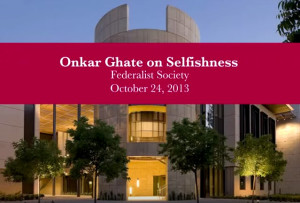 I recently came across a video posted by the Federalist Society of a talk given by ARI’s Onkar Ghate on selfishness. If you have read Ayn Rand or listened to other talks by Dr. Ghate or Yaron Brook, much of the information covered in this talk will be familiar, but I find it is often (always?) helpful to revisit ideas you are familiar with in order to achieve a better understanding of them.
I recently came across a video posted by the Federalist Society of a talk given by ARI’s Onkar Ghate on selfishness. If you have read Ayn Rand or listened to other talks by Dr. Ghate or Yaron Brook, much of the information covered in this talk will be familiar, but I find it is often (always?) helpful to revisit ideas you are familiar with in order to achieve a better understanding of them.
In this case, this deeper understanding came when Onkar answered the first question in the Q&A period following the talk. A young woman stated that she thought the common definition of selfishness was “advancing your own interests at the expense of someone else” and wondered why he hadn’t addressed this in the talk. Onkar’s response was, in part:
That is not a proper definition. … Because the idea of selfishness leaves open all kinds of things, and you have to think in contrast to what. The idea of selfishness is to make as your cause yourself and to advance your interests. It leaves open what actually advances your interests. That kind of definition builds in the idea that it is by exploiting or victimizing others. But that is an open question whether that is actually a path to advancing your interests. Indeed, part of Ayn Rand’s argument is that it does not advance your interests. So you can’t have a term that you advance your interests by doing X because it precludes a view that says “but doing X doesn’t advance your interests.”
He then goes on to say that all the term selfishness properly means is that you are the proper beneficiary of your actions, that your chief goal is to advance your own interests. This leaves open the question of what actually advances your own interests in view of the totality of your life. He compares this to other common views such as that your focus should be other people (altruism), the wilderness (environmentalism), or god (religion) all of which leave open the same question: How do I actually advance those interests?
Answering this question takes up the bulk of Onkar Ghate’s talk.
